We may earn a commission if you make a purchase through the links on our website.
The Best Cloud VDI Solutions
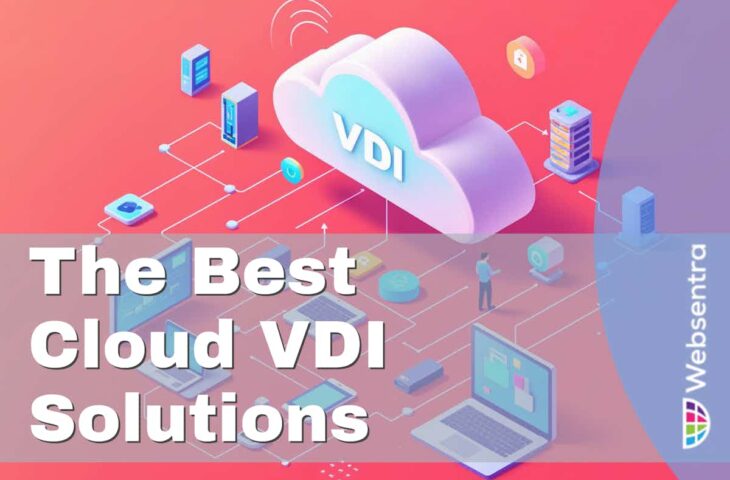
UPDATED: January 10, 2025
As remote work becomes the new norm worldwide, businesses are increasingly turning to Cloud Virtual Desktop Infrastructure (Cloud VDI) solutions to empower their teams with remote access to critical applications and data. Cloud VDI also known as Desktop-as-a-Service (DaaS) is a cloud-based solution that delivers virtual desktops to users online. In contrast to traditional desktop setups that depend on physical hardware, Cloud VDI enables employees to access their desktop environment from any device, anywhere, as long as they have an internet connection.
With Cloud VDI, the service provider takes care of all backend operations, including data storage, security, updates, and backups, eliminating the need for in-house management. This allows businesses to lighten their IT workload while ensuring employees have dependable access to their work tools and data. With a growing number of providers offering these services, choosing the right solution can be a daunting task. In this article, we'll explore the Cloud VDI solutions that stand out for their reliability, performance, and scalability.
Here is our list of the best cloud VDI providers:
- Omnissa Horizon Cloud Virtual desktop and application delivery with a hybrid DaaS platform.
- Citrix Virtual Apps and Desktops Enables you to provide the best VDI, virtual application, and DaaS experience from any cloud, on-premises, or hybrid setup.
- Microsoft Azure Virtual Desktop A cost-effective and secure cloud VDI solution for organizations of all sizes and location.
- Amazon WorkSpaces Family A fully managed VDI service that offers organizations the flexibility to decide between highly customizable virtual desktops for their employees.
- Dizzion A cloud-based VDI provider that offers services for organizations of all sizes and needs.
- Parallels RAS A flexible virtual application, desktop delivery, and DaaS solution.
- Workspot A cutting-edge cloud VDI solution designed to address the significant challenges organizations face with traditional on-premises VDI implementations.
These cloud VDI solutions were selected based on several key criteria, including market reputation, a proven track record, and comprehensive features such as scalability, security, and cloud service integration. Customer reviews highlighting performance, reliability, and ease of use were also considered. The solutions were also evaluated for their use of advanced technologies like zero trust and cloud-native architectures, competitive pricing, flexible licensing, and strong integration capabilities with other cloud and on-premises systems.
The Best Cloud VDI Providers
1. Citrix Virtual Apps and Desktops
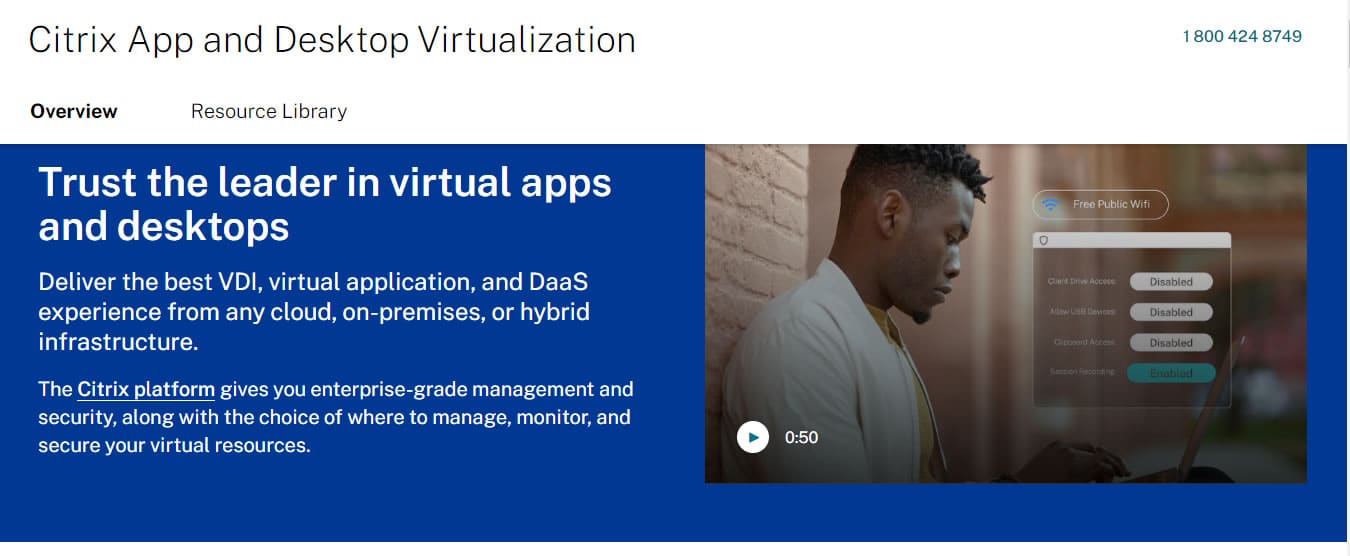
Citrix Virtual Apps and Desktops is a top cloud-based VDI solution that provides secure and reliable virtual desktop and application access to users on various devices. Citrix has been recognized as a Leader in the 2023 Gartner DaaS Magic Quadrant. It offers powerful features and flexible deployment options, making it an excellent choice for businesses aiming to boost productivity and simplify IT management.
Key Features:
- Simplified Management: Improves server scalability, speeds up logins, and enhances application performance with an easy-to-manage solution.
- Secure Work Experience: Combines cloud-based Citrix DaaS with on-premises solutions to ensure a secure work environment across any device.
- HDX Optimization Technology: Enhances productivity by providing a high-quality user experience, even with low bandwidth, particularly for unified communications and graphic-heavy applications.
- Hybrid Multi-Cloud Management: Supports workload storage across multiple clouds (Microsoft Azure, Google Cloud, AWS) and integrates seamlessly with on-premises resources.
- Flexible Deployment Options: Enables VDI, virtual applications, and Desktop-as-a-Service (DaaS) to be delivered from any cloud, on-premises, or hybrid infrastructure.
- Robust Security Features: Provides a wide array of security options to protect unmanaged endpoints, strengthening overall security.
Why do we recommend it?
We recommend Citrix Virtual Apps and Desktops for its ability to deliver a seamless virtual desktop and application experience across cloud, on-premises, and hybrid infrastructures. I found that its exceptional flexibility and security makes it ideal for businesses adapting to changing needs.
Who is it recommended for?
This solution is suitable for organizations with remote or hybrid teams and those in regulated industries requiring strong security and compliance. It’s also perfect for companies managing applications across multiple cloud environments, including Microsoft Azure, Google Cloud Platform, and AWS, thanks to Citrix’s hybrid multi-cloud capabilities.
Pros:
- High Performance: HDX optimization ensures a smooth user experience, even in challenging network conditions.
- Flexible Deployment: Citrix enables organizations to deploy virtual desktops across different infrastructures, offering the flexibility to meet changing business needs.
- Enhanced Sustainability: Optimizes the use of existing on-premises or cloud resources, endpoints, and networks, promoting better sustainability.
- Cost Efficiency: The DaaS model helps reduce IT costs while boosting agility and productivity.
- Enhanced Security: Robust security features protect sensitive data and effectively manage endpoints.
Cons:
- Dependence on Network Stability: As with any cloud-based solution, Citrix relies heavily on stable internet connectivity. Any network disruptions can cause delays or disruptions in user experience.
- Vendor Lock-in: Citrix's integration with specific cloud providers and its unique architecture can create challenges if an organization wants to migrate to a different provider or solution in the future.
2. Omnissa Horizon Cloud
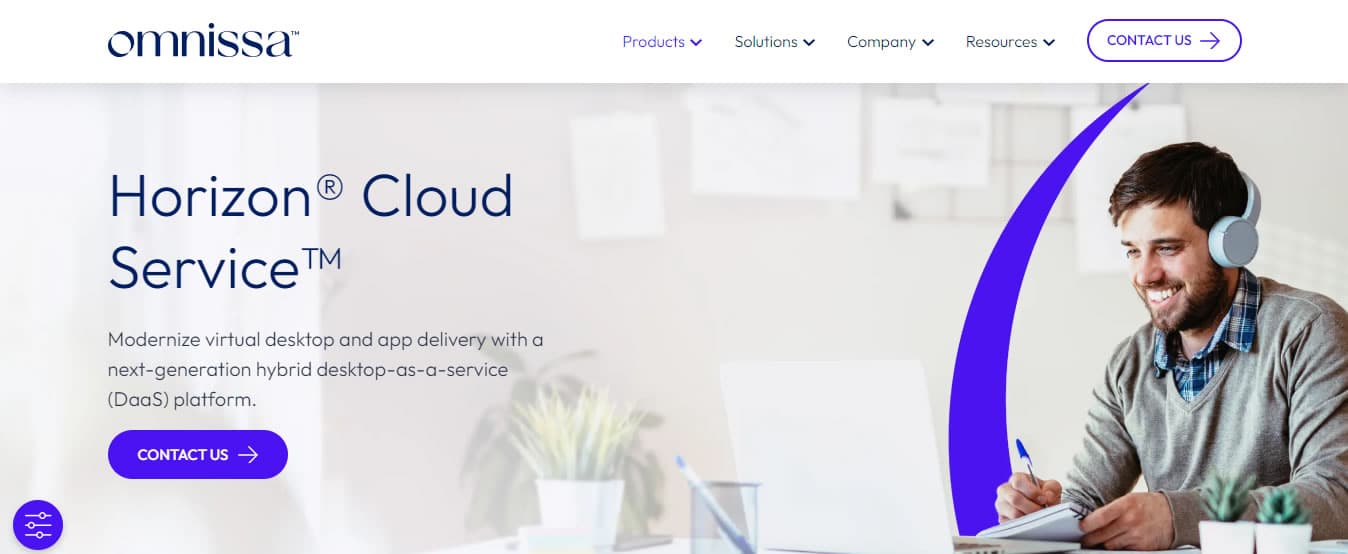
Omnissa Horizon Cloud (formally VMware Horizon Cloud) is a cloud-based VDI solution that helps organizations deliver virtual desktops and applications securely. Using advanced virtualization technology, it ensures a smooth user experience across devices and provides IT teams with the tools to manage and scale virtual environments easily.
Key Features:
- Unified Workspace: Horizon Cloud offers a single platform for managing virtual desktops and applications, giving users access to all their tools from one interface.
- High Performance: Uses advanced technologies to deliver high-performance virtual desktops, even for demanding tasks like 3D graphics and video editing.
- Advanced Management Tools: Provides tools to easily create, configure, and manage virtual desktops, user profiles, and application delivery.
- Horizon Edge: A solution that reduces infrastructure needs by replacing traditional pods with a single Edge Gateway, making deployment simpler.
- Scalability and Flexibility: The solution can be easily scaled to meet changing business needs, allowing organizations to add or remove virtual desktops as needed.
- Advanced Security: Includes multiple security layers, such as user authentication, data encryption, and secure access controls, protecting sensitive information.
Why do we recommend it?
We recommend Omnissa Horizon Cloud for its strong reputation, flexibility, and reliable performance. It allows organizations to deploy virtual desktops and applications across various environments, including public clouds, on-premises, and hybrid setups.
Who is it recommended for?
Omnissa Horizon Cloud is ideal for organizations with remote or hybrid workforces, providing secure access to key applications and data from any device. It's especially beneficial for industries like healthcare and finance, where high security and compliance are essential.
Pros:
- Centralized Management: A comprehensive management console simplifies deployment and monitoring, streamlining IT operations.
- Flexible Deployment Options: With a multi-tenant, cloud-scale architecture, organizations can also choose the best location for their virtual desktops and applications—on-premises, hybrid, or multi-cloud.
- Enhanced Stability and Reliability: Centralizing more management components in the Horizon Control Plane reduces the number of elements to manage, increasing stability and reliability.
- Easy Access: A unified workspace allows easy access to virtual desktops and applications, boosting user productivity and satisfaction.
- Faster Deployment: Everything is pre-configured and ready to use out of the box. This simplified deployment model eliminates the need for complex infrastructure setups.
Cons:
- Potential for Vendor Lock-in: Because Omnissa Horizon Cloud is tightly integrated with VMware's ecosystem, migrating to a different provider could be complex and costly, creating a potential for vendor lock-in.
3. Azure Virtual Desktop
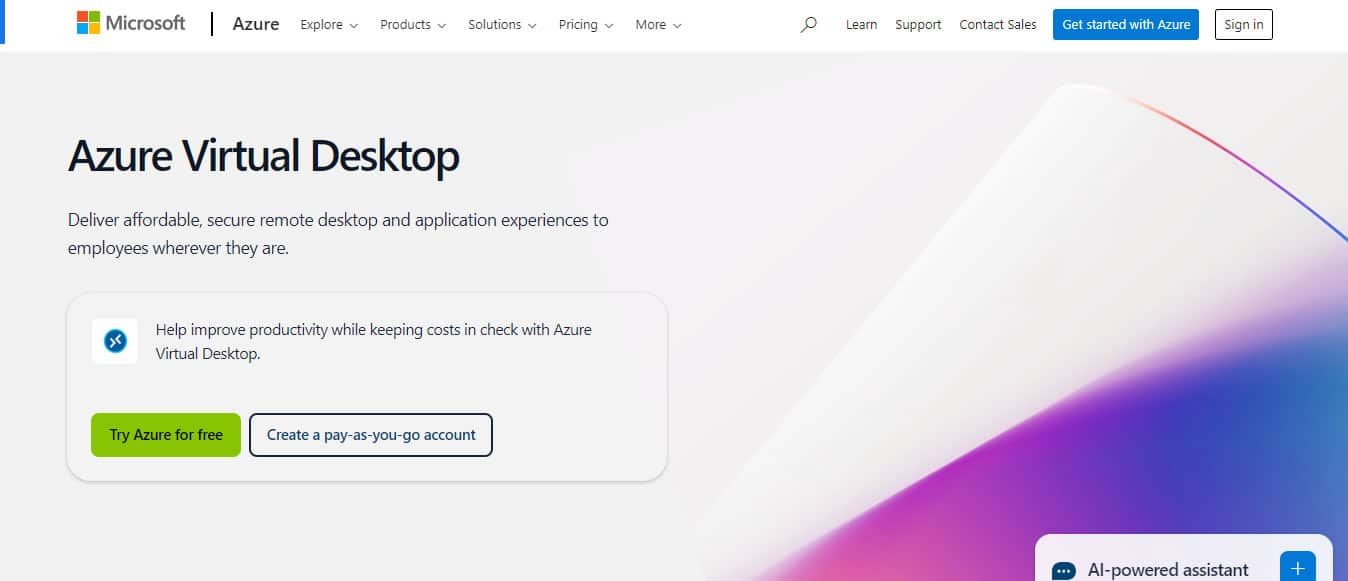
Microsoft Azure Virtual Desktop is a cloud-based VDI solution that gives users a complete desktop experience from almost any device. Built on the reliable Azure infrastructure, it offers flexibility, security, and scalability, making it a great choice for businesses of all sizes. Microsoft was named a Leader in the 2023 Gartner DaaS Magic Quadrant.
The solution manages the entire VDI, including the broker, gateway, load balancer, and diagnostics. IT teams only need to manage Windows 10 and 11 remote desktops, applications, and governance policies.
Key Features:
- Familiar Windows Environments: Access various Windows versions, including Windows 11, Windows 10, and Windows Server (2022, 2019, 2016).
- Multi-Session Support: Windows 11 and Windows 10 multi-session allow multiple users to access a single virtual machine at the same time, helping reduce costs.
- Control and Resilience: Microsoft handles all control plane management, ensuring a reliable, global infrastructure for your virtual environment.
- Connection Quality Monitoring: Monitor connection quality to guarantee optimal performance and deploy virtual infrastructure in secure Azure regions worldwide.
- Flexible Networking Options: Use networking features like Azure Private Link and RDP Shortpath to enhance security and reliability.
- Host Pool Management: Take advantage of advanced features, such as custom image templates, to efficiently manage large-scale deployments.
Why do we recommend it?
We recommend Azure Virtual Desktop for its secure and reliable access to virtualized Windows 10 and 11 desktops and applications. I learned that Azure helps reduce costs with its multi-session feature, allowing businesses to pay only for the resources they use. This mix of security, flexibility, and cost-efficiency makes Azure a great choice for virtual desktop infrastructure.
Who is it recommended for?
Azure Virtual Desktop is ideal for organizations experienced in managing VDI solutions, looking to provide employees with a secure, remote Windows desktop experience for various use cases.
Pros:
- Simplified Management: Microsoft handles the control plane, freeing IT teams to focus on other strategic tasks.
- Familiarity: Users access familiar Windows environments, which reduces the learning curve and boosts productivity.
- Pay-Per-Use Model: Scale resources as needed, paying for compute capacity by the second, with no long-term commitments or upfront costs.
- Scalability: Easily adjust resources up or down based on demand, without large initial investments.
- Cost Efficiency: Multi-session support and the pay-per-use model help lower costs, making it easier for organizations to manage their budgets.
Cons:
- Dependency on Azure: Since AVD is tightly integrated with Azure, businesses may experience vendor lock-in, making it more difficult or costly to switch to a different cloud provider in the future.
- Potential Cost Overruns: While the pay-per-use model is advantageous, mismanagement of resources could lead to unexpected costs.
4. Amazon WorkSpaces
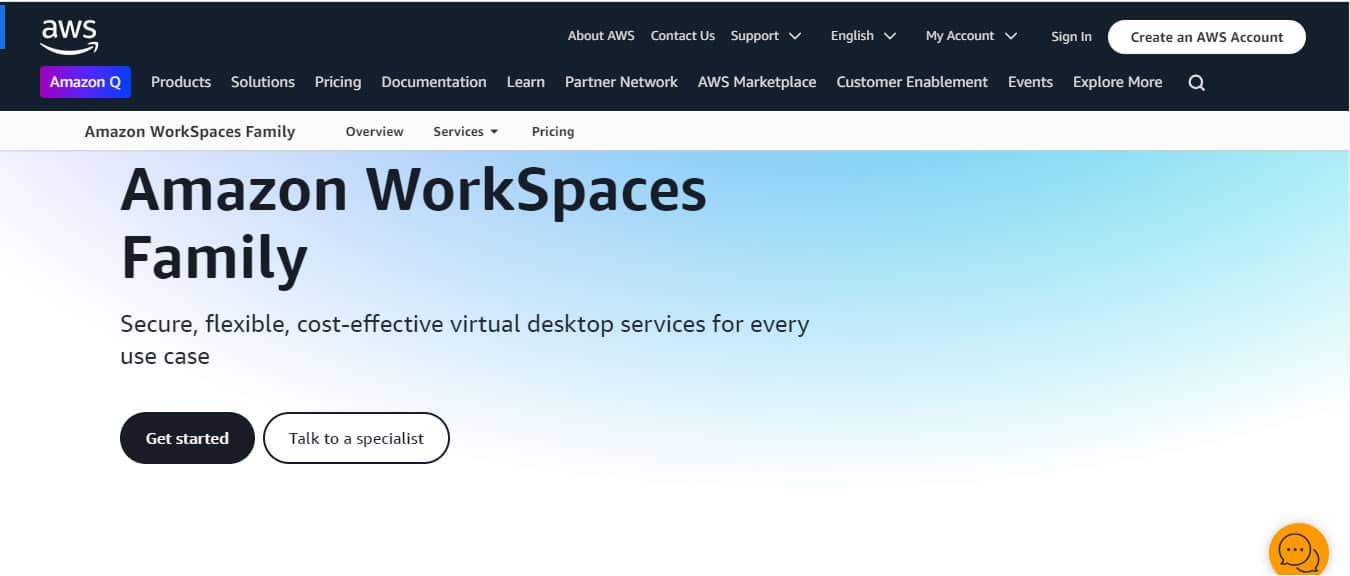
Amazon WorkSpaces is a fully managed VDI service that provides organizations with easy access to applications and data, helping to reduce costs and boost productivity. In addition, Amazon WorkSpaces Core offers VDI APIs for integrating third-party software, enabling customized solutions with virtual desktop-optimized compute instances.
Key Features:
- Seamless Access to AWS Applications and Data: Users can easily access AWS-hosted applications and data, ensuring productivity and business continuity.
- Strong Security and Compliance: Built on AWS's secure infrastructure, WorkSpaces offers high security and a 99.9% uptime SLA.
- Flexible Licensing Options: Integrates Microsoft 365 Apps for Enterprise, allowing use of familiar productivity tools.
- Unified Management: Admins can manage both WorkSpaces Personal and WorkSpaces Pools desktops with a single set of tools.
- Adaptive Onboarding Tool: The AWS Management Console offers an onboarding tool that suggests configurations based on specific needs.
- Support for Third-Party VDI Solutions: WorkSpaces Core enables integration with third-party VDI solutions while benefiting from AWS's security and scalability.
Why do we recommend it?
We recommend Amazon WorkSpaces because it offers a flexible virtual desktop solution for different types of workers, ensuring everyone has the right desktop for their needs, no matter where they are. I discovered that the pay-as-you-go model also makes it a cost-effective option, as organizations only pay for the resources they use.
Who is it recommended for?
Amazon WorkSpaces is ideal for organizations with remote or hybrid teams, providing flexible virtual desktop access from anywhere. It's perfect for businesses that need to support various user types, including full-time employees, seasonal workers, and contractors, with customized desktop experiences.
Pros:
- Enhanced Productivity: Provides a stable, reliable environment for remote work, ensuring users can access necessary applications and data anytime.
- Reduced Administrative Burden: Automated configuration suggestions simplify the onboarding process, easing the management of virtual desktops for IT teams.
- Simplified Migration: WorkSpaces Core makes it easier to migrate from existing VDI solutions by allowing businesses to use familiar management tools alongside AWS's powerful infrastructure.
- Flexible Pricing Model: Offers both monthly and hourly billing options, so businesses only pay for the resources they use.
- Cost-Effective Scaling: The pay-as-you-go model allows organizations to scale their VDI up or down based on demand, helping to optimize costs.
Cons:
- Dependency on AWS: Organizations are reliant on AWS’s infrastructure, which could be a concern for those seeking multi-cloud or on-premises solutions.
- Potential for Fluctuating Costs: While hourly billing can be cost-effective, costs may fluctuate based on usage, making budgeting more difficult to predict.
5. Dizzion
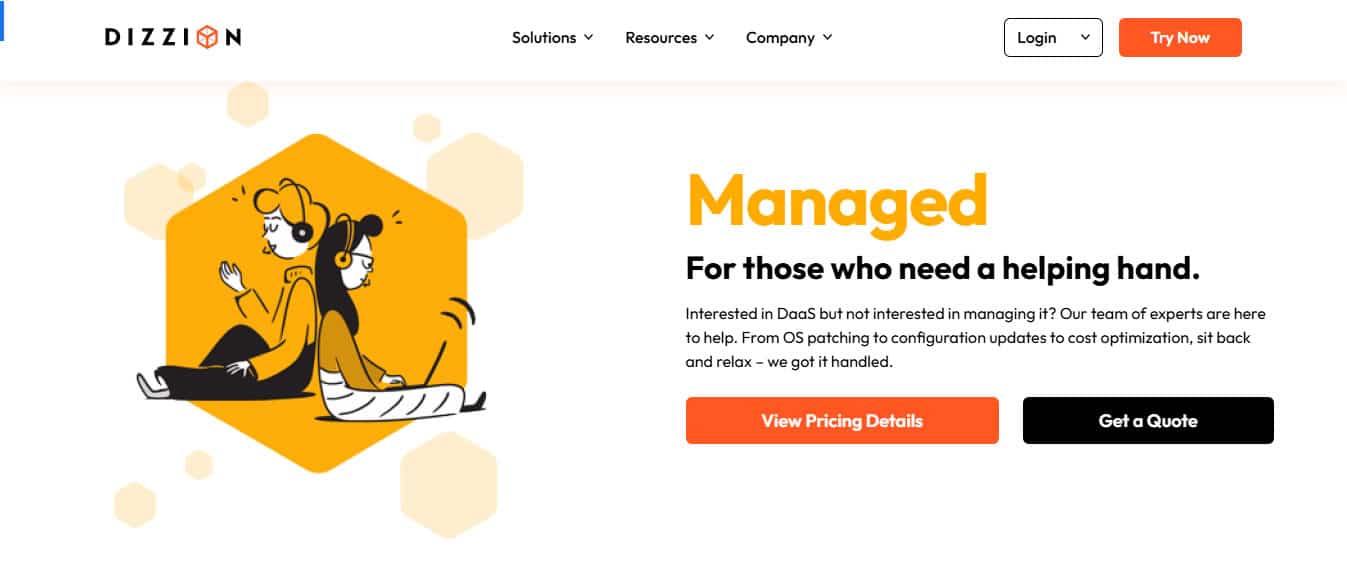
Dizzion is a cloud-based VDI provider offering a range of services that cater to organizations of various sizes and needs. With its powerful, cloud-native platform and flexible deployment options, Dizzion makes transitioning to virtual desktops easy and efficient. Dizzion offers a fully managed DaaS solution for those not interested in managing it themselves, ensuring security, flexibility, and scalability.
Key Features:
- Flexible Deployment Options: Dizzion allows you to deploy your virtual desktops on your preferred cloud platform, including AWS, Google Cloud Platform, Microsoft Azure, and Nutanix AHV for on-premises setups. This gives businesses the freedom to choose the best infrastructure for their needs.
- Multi-Cloud and Hybrid Support: Dizzion ensures no vendor lock-in by providing support for true hybrid and multi-cloud environments, allowing organizations to scale and deploy workloads seamlessly across various public clouds.
- Intuitive Admin Console: The platform provides a single-pane-of-glass management console that simplifies administrative tasks. With features like one-click configurations, guided deployment wizards, and robust APIs, IT teams can manage virtual desktops efficiently and with minimal effort.
- Seamless User Experience: Dizzion ensures a seamless user experience with native in-session VoIP, video conferencing, 4K resolution, 60 fps, and multiple monitor support, all from a web browser.
- Flexible Cost Management: Dizzion offers a pay-as-you-go model using IaaS credits, which allows businesses to optimize their cloud usage, providing flexibility in budgeting and cost management.
- Scalability: The platform is highly scalable, accommodating growing organizations by enabling easy expansion and flexibility in resource allocation.
Why do we recommend it?
We recommend Dizzion for its ease of use, flexibility, and strong multi-cloud support. Dizzion makes the process of adopting VDI simpler, offering users a choice between fully managed services, DIY deployments, and complete turnkey solutions. I observed that this makes it a great fit for businesses of all sizes and expertise levels. Dizzion’s support for public clouds like AWS, Azure, Google Cloud, and on-premises setups provides users with true multi-cloud flexibility, eliminating vendor lock-in.
Who is it recommended for?
Dizzion is ideal for organizations (enterprises, SMBs, remote and hybrid workforce) that need flexible VDI solutions, whether they are new to virtual desktops or have experience with cloud deployments.
Pros:
- Easy to Use: The platform is intuitive, with an easy-to-navigate admin console and no need for complex client installations.
- Dedicated Customer Success Manager: With Dizzion’s managed offering, you receive personalized support through an assigned customer success manager, ensuring that your needs are addressed promptly and your virtual desktop environment runs smoothly.
- Proactive Windows Patching: Dizzion takes care of Windows patching, ensuring that your systems are always up to date with the latest security updates and improvements.
- Enhanced Monitoring and Analytics: Dizzion offers advanced monitoring and analytics tools, allowing IT teams to gain valuable insights into system performance, usage patterns, and potential issues.
- Optimized Configuration and Compliance: Dizzion ensures that your virtual desktops are configured optimally and comply with industry best practices, enhancing performance, security, and efficiency while minimizing operational risks.
Cons:
- Dependency on Cloud Infrastructure: As a cloud-based platform, organizations relying on it will need a reliable internet connection. For businesses without a robust cloud strategy, this could introduce challenges.
- Learning Curve for New Users: While the platform is intuitive, there may still be a learning curve for businesses unfamiliar with Dizzion's particular offerings or multi-cloud VDI configurations.
6. Parallels Remote Application Server (RAS)
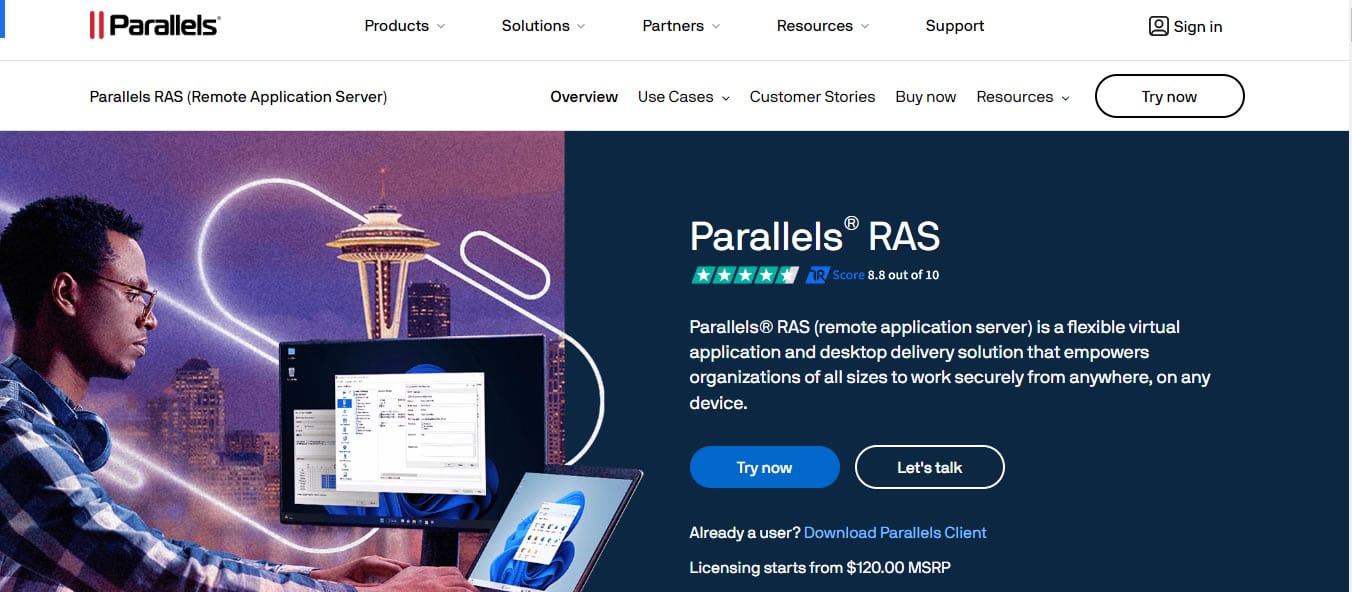
Parallels RAS is a virtual application and desktop delivery solution that enables organizations of all sizes to work securely from any location on any device. Its cloud-native, Desktop-as-a-Service (DaaS) solution that offers users secure, instant access to their virtual applications and desktop environments. Users can access these applications seamlessly through the Parallels Client, which is compatible with a wide range of devices.
Key Features:
- Seamless Integration: Works with major hypervisors as well as cloud platforms such as Azure and AWS.
- User-Friendly: Quick onboarding and 24/7 technical support help users get up to speed quickly.
- Hybrid Deployment: Supports hybrid setups, including on-premises, private cloud, and public cloud options, providing flexibility in resource management.
- Cross-OS Compatibility: Works across various operating systems, including Windows, macOS, Linux, iOS, Android, and HTML5 web browsers.
- Strong Security and Compliance: Offers secure user sessions with SSL/TLS 1.3 encryption and FIPS-140-2 compliance, meeting high-security standards.
- Unified Management Console: A single console for managing apps, desktops, images, reporting, load balancing, and access control, streamlining administrative tasks.
Why do we recommend it?
We recommend Parallels RAS for its flexibility, ease of use, strong security, and cost-efficiency. I noticed that it provides a complete solution that supports modern work environments, boosts productivity, and reduces IT management efforts.
Who is it recommended for?
Parallels RAS is ideal for small to medium-sized businesses (SMBs), remote teams, IT departments, and organizations that value flexibility, security, and cost savings in their virtual desktop and application delivery.
Pros:
- Simplified Management: Parallels RAS simplifies the management of virtual applications and desktops with a single administrative console.
- Easy Deployment: As an all-in-one solution, Parallels RAS offers fast onboarding and deployment times, combined with 24/7 support and free technical training.
- Affordable Pricing: Offers competitive pricing, with a one-year subscription priced at $120 per concurrent user for a minimum of 15 users, making it accessible for teams of all sizes.
- 30-Day Free Trial: Users can take advantage of a 30-day free trial, allowing them to explore the features and benefits of Parallels RAS before committing to a subscription.
Cons:
- Dependence on Internet Connectivity: Being a cloud-based solution, Parallels RAS relies on stable Internet access. Network issues can affect performance and user access to applications.
- Licensing Model: The concurrent user licensing model may not be ideal for organizations with varying user numbers or those needing more flexible licensing options.
7. Workspot
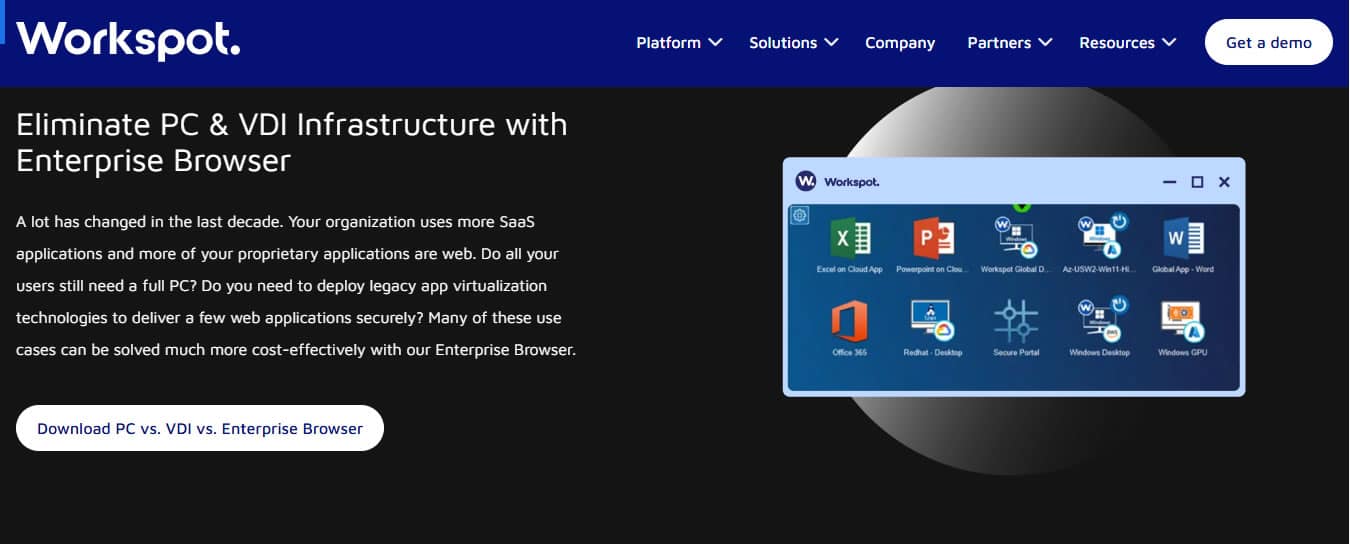
Workspot is a cloud-based VDI solution that addresses the challenges of traditional on-premises VDI. It offers virtual desktops and applications tailored to user needs, leveraging cloud services from Microsoft Azure, Google Cloud, and AWS. This multi-cloud approach supports hybrid strategies and ensures business continuity, disaster recovery, and high availability.
Key Features:
- Workspot Client: Workspot Client provides access to virtual desktops and applications from any device with ease.
- Unified Management: Workspot Control, a centralized admin console simplifies the provisioning and management of digital workplace deployments.
- Unified Real-time Observability: Workspot Watch features a built-in analytics engine that offers real-time insights into user session health.
- Unified Historical Observability: Workspot Trends provides insights into the reasons behind any dissatisfaction and identifies when issues arose.
Why do we recommend it?
We recommend Workspot because it addresses many of the common challenges faced by organizations using traditional on-premises solutions. I found that it offers Zero Trust Security, promising a 99.99% availability rate.
Who is it recommended for?
Workspot is suitable for mid to large-sized enterprises looking to simplify their VDI deployment while maximizing ROI. It allows remote or hybrid workforces to work from anywhere on any device without sacrificing performance.
Pros:
- Return on Investment (ROI): Workspot helps organizations achieve the highest ongoing ROI.
- Enhanced Availability: Workspot Global Desktop allows users to transition smoothly between virtual desktops, reducing disruptions.
- Business Agility: Supports hybrid and multi-cloud strategies, enabling organizations to adapt to various use cases and business needs quickly.
- Increased Productivity: Workspot includes embedded business intelligence for data-driven performance tuning.
- Reduced Total Cost of Ownership: Quick pilot program setup and automatic scaling reduce resource needs.
Cons:
- Learning Curve for: IT teams may need time to adapt to Workspot’s admin tools, impacting initial management efficiency.